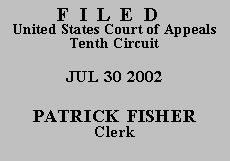

| CURTIS A. EVANS,
Plaintiff - Appellant, v. SUPREME COURT OF THE STATE OF COLORADO; COLORADO BOARD OF LAW EXAMINERS; JUSTICE MARY J. MULLARKEY; JUSTICE MICHAEL L. BENDER; JUSTICE GREGORY J. HOBBS, JR.; JUSTICE REBECCA L. KOURLIS; JUSTICE ALEX J. MARTINEZ; JUSTICE NANCY E. RICE; JUSTICE GREGORY K. SCOTT, and Board Members A-K, Defendants - Appellees. |
|
On March 24, 2000 Curtis A. Evans, a member of the New York state bar, filed a civil rights complaint under 42 U.S.C. § 1983. He alleged the Colorado Supreme Court and the Colorado Board of Law Examiners violated his rights under the Equal Protection Clause and Privileges and Immunities Clause of the United States Constitution by refusing him admission to the Colorado State Bar. Because his complaint was filed after the statute of limitations had run the district court dismissed it. We affirm.
Mr. Evans took the New York State Bar Examination in July 1996 and scored 159 on the multi-state portion. He was admitted to the New York State Bar on January 28, 1997.
On January 8, 1997, Mr. Evans requested forms from the Colorado Board of Law Examiners to apply for admission to the Colorado State Bar without taking the Colorado Bar Examination. Colo. R. Civ. P. 201.3(1)(b) allowed admission if the applicant: (1) was admitted to practice in another jurisdiction and (2) attained a score of 152 or higher on the multi-state bar examination within two years of filing a Colorado Bar application. Unfortunately for Mr. Evans that rule was repealed effective January 1, 1997, before he requested admission to the Colorado State Bar, and before he was admitted to practice in another jurisdiction.
Upon learning that the rule was repealed, Mr. Evans petitioned the Colorado Supreme Court for admission to the state bar notwithstanding the repeal; his petition offered constitutional arguments in support of his request. The court denied his petition on February 13, 1997. Undaunted, on March 4, 1997 Mr. Evans mailed a second petition to the Colorado Supreme Court. His new petition again requested admission under the repealed rule and made restated and additional arguments. The latter request was also denied.
Civil rights claims are time barred by the relevant state statute of limitations. See Blake v. Dickason, 997 F.2d 749, 750 (10th Cir. 1993). In this case it is two years. Colo. Rev. Stat. § 13-80-102(1)(i) (1987).
"A civil rights action accrues when the plaintiff knows or has reason to know of the injury which is the basis of the action." Smith v. City of Enid ex rel. Enid City Comm'n, 149 F.3d 1151, 1154 (10th Cir. 1998). Mr. Evans knew or should have known he would not be admitted to the Colorado State Bar under the repealed rule when his first request was denied on February 13, 1997. That denial is "the injury which is the basis of the action." Smith, 149 F.3d at 1154. Mr. Evans confirmed his knowledge of the denial when he filed his second petition on March 4, 1997. Construing the facts most charitably to him, the time allowed to file a civil rights complaint began to run on March 4, 1997. Despite evident actual knowledge of the injury about which he complains, Mr. Evans did not bring his civil rights action until March 24, 2000, more than three years later.
On appeal, Mr. Evans argues that the limitations period should be equitably tolled to excuse his late filing. Because he did not raise the doctrine of equitable tolling in the district court, we decline to consider it on appeal. "[A]bsent extraordinary circumstances, [this court] will not consider arguments raised for the first time on appeal. "This is true whether an appellant is attempting to raise 'a bald-faced new issue' or a new theory on appeal 'that falls under the same general category' as [a previous argument.]" McDonald v. Kinder-Morgan, Inc., 287 F.3d 992, 999 (10th Cir. 2002) (quoting Lyons v. Jefferson Bank & Trust, 994 F.2d 716, 722 (10th Cir. 1993) (citation omitted)).
Mr. Evans's complaint was time barred. For that reason the judgment of the district court dismissing the complaint is AFFIRMED.
Entered for the Court
Circuit Judge
*. This order and judgment is not binding precedent, except under the doctrines of law of the case, res judicata, and collateral estoppel. The court generally disfavors the citation of orders and judgments; nevertheless, an order and judgment may be cited under the terms and conditions of 10th Cir. R. 36.3.